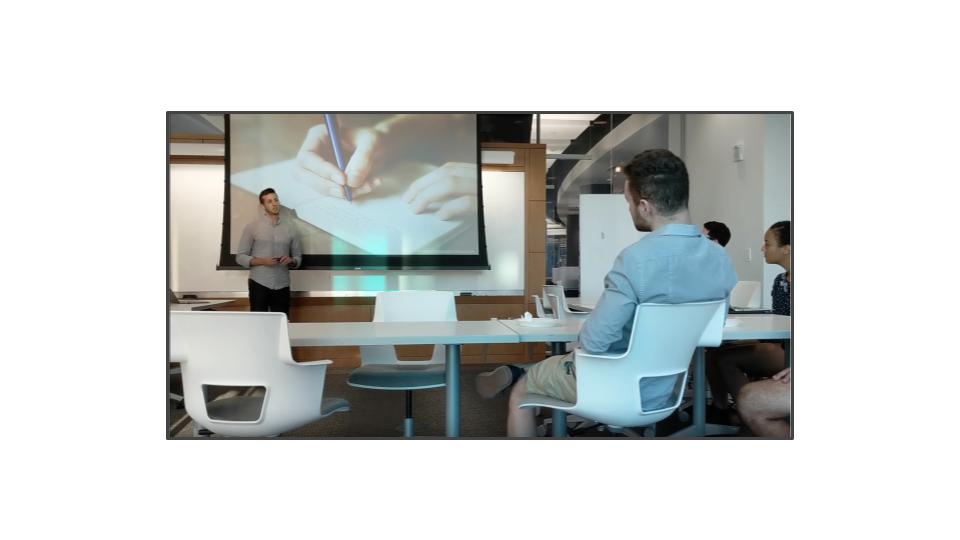The case for being different
“Average people get average results.
Extreme people get extreme results.”
I see this problem everywhere; we want to improve our lives, but at the same time, we want to follow the status quo.
It’s foolish when you think about it. How could you possibly get different results by following the same plan?
If you copy what everyone else is doing, you’re sure to be like everyone else.
Going to Extremes
To get extreme results, you must be willing to do something extreme.
- Wake up at 5am to workout, meditate, or reflect
- Record daily habits or build a decision journal
- Lock yourself out of social media to remove distractions
Theres no doubt some people are practicing this, but it’s a small minority. If you copy the crowd, you’re destined to their results. To achieve something more incredible, you must be willing to stand out from the mass and do what others aren’t willing to try.
Sit down and consider what you’re doing differently, and if the answer is not much, make a change.
The Digital Era
I am now convinced that disconnecting from technology (especially social media) is an Extreme Results power move. Taking a walk outside, sitting quietly in solitude, or journaling your thoughts is a unique path that 99% of us aren’t willing to take.
Yet this type of pursuit makes us more human and allows our brains to process the millions of inputs we jam into our heads everyday.
Even if it’s just for 20 minutes, that’s 20 minutes more than anyone else.
*Inspired via Digital Minimalism by Cal Newport
I once met a Billionaire
Every highly successful person I’ve ever met has had their quirks.
You’ve probably had your own experience, or even heard similar stories from others. It’s funny how this narrative prevails – we finally get to meet someone we look up to, and we expect them the be everyone else. “They should be normal,” we think. Yet they’ve done something so unusual.
Once you realize the connection between quirks and success, you can harness your full potential.
Be yourself. Do something uncommon and go get uncommon results.
June 3rd, 2019
Which game are you playing?
“Good things do not return in a one-for-one manner.
Individual actions are not directly rewarded.
It is on average that doing good improves the quality of life
for you and the people around you.”
-Scott Adams, God Debris
1 Action = 1 Outcome
Our brains are wired to understand our choices and their relationship to the world as one-for-one.
If you tie your shoes, then you won’t trip. That’s a single action, which returns a single outcome. It doesn’t take long for you to recognize the relationship between these two actions, and for you to adopt the new behavior into your life.
This mental model is helpful, and it has allowed humans to survive.
When Caveman Carl slept in a cave, he decreased his likelihood of being eaten by Tigers. The benefit of improved safety was immediately realized and he moved into his new home the next day. Carl’s Cave-Estate was passed down to future generations, and his family lived on.
One single action, led to one positive outcome.

Many Actions = 1 (Better) Outcome
However the greatest ROI comes from many-for-one outcomes; areas where it takes a great deal of tries, repeating the same behavior, without experiencing any benefits in the short-term.
Take exercising. If you go to the gym only twice, that will not cut it. There’s a high probability that your body will ache and you will not notice any difference in your physical appearance.
However, if you make exercise a daily habit, after 2 months you will lose weight, have more energy, and notice physically differences.
Many-for-one outcomes take a long time to provide a return, but when the results finally appear, the payoff is exponentially larger.
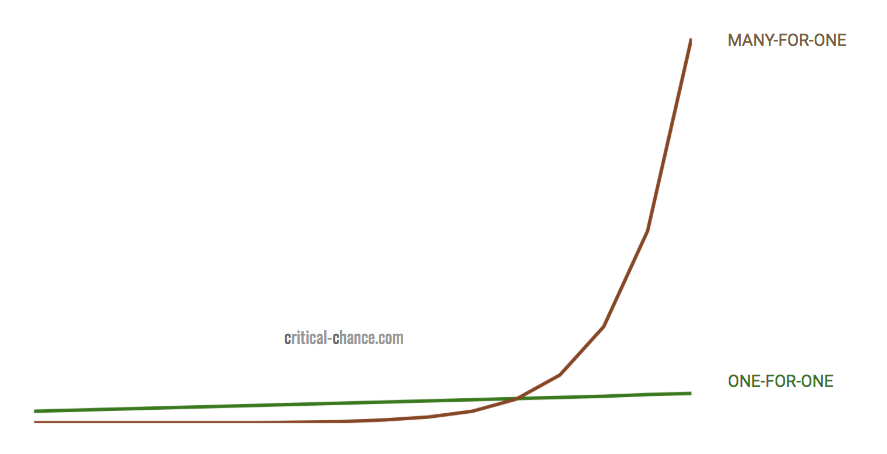
The games we play
Taking longer than expected?
Facing a small setback?
Don’t get discouraged, there’s a good chance you’re just playing a many-for-one game. Remember that you’re in the business of maximizing your total potential, which is the greatest game you can play. These wins come over long periods of high volume effort; that’s unavoidable.
To grow stronger, make exercise a ritual.
To sell a company, launch as many as you can.
To build a reputation, serve others first.
Be patient.
Good outcomes require great effort.
Onward!
-Alex
March 18th, 2019
Change your story, change your world
Steve Jobs gave a commencement speech at Berkley in 2005.
Hey readers,
Last week I was invited to speak at Indiana University’s Kelley Business School. The theme for the day was innovation; where does it come from?
My talk bridges lessons from successful entrepreneurs (what did they do differently?) and my own college experience (which events, in hindsight, made all the difference?).
Check out the video below, and if you enjoy it, share and subscribe!
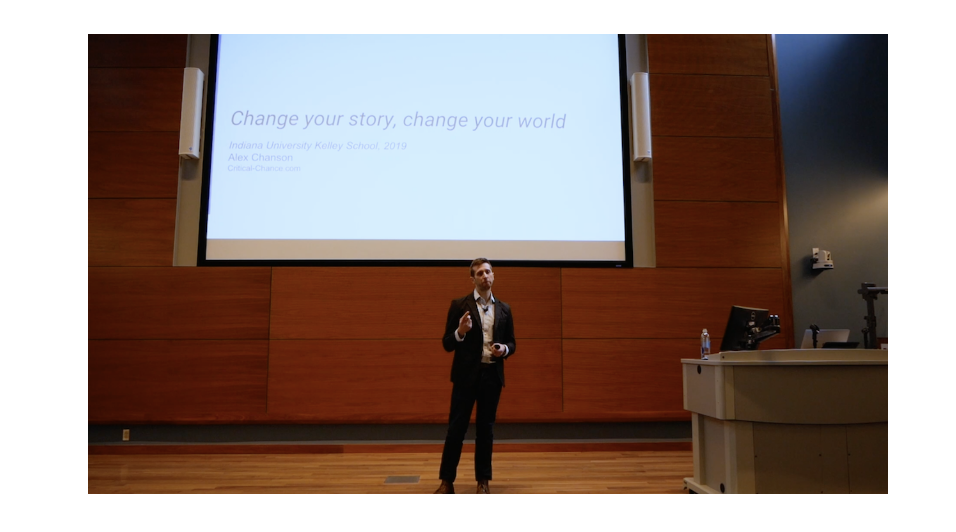
Let’s spread positivity together.
-Alex
March 4th, 2019
How this billionaire predicted the future
Steve Jobs gave a commencement speech at Berkley in 2005.
By this time, Apple had become one of the most successful enterprises of the new Millennium. Jobs was famous for having a set of unique experiences – he believed these were critical in forming his opinions and ideas at Apple.
So how did he know that his past experiences would help create Apple?
Well, he didn’t.
Here’s Steve on predicting the future:
You can’t connect the dots looking forward; you can only connect them looking backwards.
So you have to trust that the dots will somehow connect. You have to trust in something – your gut, destiny, life, karma, whatever.
This approach has never let me down, and it has made all the difference in my life.
From Apple to Chess
When I was a kid, Chess was one of my favorite games.
In Chess you spend most of your energy trying to guess your opponents next move. When they play a knight, your brain visualizes the new locations on the board. You work to understand the updated positions, as each move creates an entirely new game.
“How will this help or hurt me?” you wonder.
Well, Chess is shockingly similar to another game: the game of life.
Unpredictable Paths
Humans are terrible at seeing the future.
We tend to believe that our ability to predict leads to success, however that’s not quite true.
Preventing yourself from making a critical mistake allows you to keep playing the game, but it’s usually the unpredicted events which lead to your victory.
This is the same in businesses as it is in personal development. Odds are that a critical component of you (as you are today) did not exist when you first started. Whether that’s your newfound interest in running 5K races, or the way you pitch to clients.
With this hunch, The New York Times wanted to better understand which career paths most executives took before becoming CEOs.
After interviewing across all fields, one pattern emerged: there was no path.
From musical theater to religion, CEOs were less concerned about their current trajectory in the moment and more focused on learning from each experience.
“Rather than wondering if they are on the right career path, they make the most of whatever path they’re on, wringing lessons from all their experiences.”
What about you?
This week, pay more attention to novel differences. While hidden in the background, these may lead to your future successes.
As Steve Jobs points out, you have to trust your gut.
Plus, we all know it’s your unwavering curiosity that really checkmates the King.
Now go setup your board.
October 29th, 2018
Three lessons on human potential
Two weeks ago I had the opportunity to speak with student leaders at Vanderbilt University.
They gave me ten minutes and free range for topic, so naturally I chose Human Potential. Part of this lecture contains material from my happiness talk which I present at Google.
Check it out below, and if you enjoy, please subscribe for more =)
Would love to hear your feedback, and as always…
Happy Monday
-Alex
October 15th, 2018
Are you making this mistake?
Once upon a time, there was a young man who loved the outdoors, and aspired to own a farm one day.
But he grew up in the city where his still family lived, and he was expected to return.
After graduating from school, the man found a job in an office. The pay was reasonable, so he accepted.
“One day, I will build my farm.” he said.
With good fortune, the man was successful at work; promotions led to more responsibilities. More people depended on him at work, so he found it harder to leave.
“One day, I will build my farm.” he said.
The man fell in love and started a family. Ten years turned into twenty, which quickly became forty. One day the young man woke up and looked at himself in the mirror, he wasn’t so young anymore.
Soon after, he fell sick and passed away.
He was cherished and missed by many.
But nobody knew him as a farmer.
From starting a business to beginning a positive habit, we all have these aspirations, but we never start.
Take working out:
- We all agree that doing 10 pushups is good for you
- How long does that realistically take? Two, maybe three minutes?
- If you did this everyday and added one pushup every few days, you’d be significantly stronger by the end of the year
Yet we never start, which ultimately robs us of our total potential.
“The willingness to start is the littlest thing in life that makes the biggest difference.
Life isn’t a dress rehearsal.
Only one person lives in the spotlight, but everyone benefits from stepping on stage.”
-James Clear
Take the first step today, and embrace your aspirations…
Go build your farm.
October 8th, 2018
When a wave comes
A wise man was once asked to share one piece of advice to a large group of people.
“When a wave comes, go deep,” he said.
The crowd stared back at him puzzled, so he continued.
“There are three things you can do when life sends a wave at you.
You can run from it, but then it’s going to catch up and knock you down. You can fall back on your ego or try to stand your ground, but then it’s going to clobber you.
Or you can use it as an opportunity to go deep, and transform yourself to match the circumstances… and that’s how you get through the wave.”
There will be times in your life where an unexpected event may happen. Your reality is changed, you may feel uncertain about how to move forward. During these times, there’s only one true way to get through:
Embrace the riptide and go deep.
Because when we match the depths of our challenges, we come out even stronger.
October 1st, 2018
Is failure holding you back?
“If you want to become whole, let yourself be partial.
If you want to become straight, let yourself be crooked.
If you want to become full, let yourself be empty.
If you want to be reborn, let yourself die.
If you want to be given everything, give everything up.”
– Lao Tzu
Read more about the Tao Te Ching here.
….
Who turned setbacks into success?
J.K. Rowling spent her post-college years lost.
Since her parents grew up poor, they strongly encouraged her to get a vocational degree instead of studying Literature in college. When she decided to ignore their advice, J.K developed a fear that her parents were right and she would end up a failure.
It was seven years after graduating when she hit rock bottom; her short marriage ended, she lost her job, and she was a single parent (not to mention nearly homeless).
“The fears that my parents had had for me, and that I had had for myself, had both come to pass, and by every usual standard, I was the biggest failure I knew,” she would later say.
Yet it was experiencing this failure, which freed her to write Harry Potter.
Fifteen years later, Rowling highlighted this integral life moment in her commencement speech delivered to Harvard graduates:
“So why do I talk about the benefits of failure?
Simply because failure meant a stripping away of all the inessential. I stopped pretending to myself that I was anything other than what I was, and began to direct all my energy into finishing the only work that mattered to me.
Had I really succeeded at anything else, I might never have found the determination to succeed at the one area I believed I truly belonged.
I was set free, because my greatest fear had been realized and I was still alive… And so rock bottom became the solid foundation on which I rebuilt my life.”
-J.K. Rowling
Watch her speech here.
….
Is your obstacle instead an advantage?
Our instinct is to run away from uncomfortable experiences but that’s a mistake.
It’s our journey that informs us of our true selves; including the downs as much as the ups.
It isn’t until you lose that you realize how badly you wanted to win… or, perhaps, that the score never mattered at all.
To succeed, let yourself fail.
When we hit rock bottom we have the opportunity to remodel and embrace our full potential.
Are you striving towards yours?
September 17th, 2018
Are you striving for this moment?
“BOY,” a German music duo, was touring the U.S. in 2017.
Their recent album was selling well in Europe, but they were still relatively unknown. When they arrived in Brooklyn for their first show, they were prepared to inspire a crowd of new listeners.
Yet when they started performing, they froze in awe; the entire audience was singing their song.
After decades of practice, this is the moment we strive for.
- an olympic athlete runs ten miles each day, just to compete in a single 100-yard dash
- a parent sacrifices personal interests for that of their children, just to see their kids discover a passion
- a musician practices in solitude each day, just to hear one person sing their song
It’s where our determination finally meets our aspirations.
Some people dream of success, while other people get up every morning and make it happen.
-Wayne Huizenga
Your moment is out there, waiting.
Go make it happen.
August 21st, 2018
Every Story Needs Chapters
Chapter 1
I walk down the street.
There is a deep hole in the sidewalk
I fall in.
I am lost…
I am hopeless.
It isn’t my fault.
It takes forever to find a way out.
Chapter 2
I walk down the same street.
There is a deep hole in the sidewalk.
I pretend I don’t see it.
I fall in again.
I can’t believe I’m in the same place.
But it isn’t my fault.
It still takes a long time to get out.
Chapter 3
I walk down the same street.
There is a deep hole in the sidewalk.
I see it is there.
I still fall in…it’s a habit
My eyes are open; I know where I am;
It is my fault.
I get out immediately.Chapter 4
I walk down the same street.
There is a deep hole in the sidewalk.
I walk around it.Chapter 5
I walk down another street.
It’s easy to beat ourselves up for falling back into bad habits.
- Snack on junk food after a day of healthy eating
- Miss a few workouts after a week of daily exercise
- Buy an expensive gift after a month of deliberate saving
We forget that self-improvement is ongoing; habit change takes time. Our greatest ambitions take years (even decades); they are achieved through incremental improvements and compounding interest.
Instead of focusing on getting it perfect right away, focus on progressing to the next chapter.
You’re not flawless and never will be.
Dust yourself off and get out there, you have a story to write.
August 6th, 2018
Story: Autobiography in Five Chapters by Portia Nelson
Three Quotes on Failure
“Success is not final, failure is not fatal: it is the courage to continue that counts.”
-Winston Churchill
We tend to allow the fear of failure or rejection to stop us from starting the things we care about. Truth is, failure is inevitable, and in all cases, it is necessary for progress.
“It is impossible to live without failing at something, unless you live so cautiously that you might as well not have lived at all – in which case, you fail by default.”
-J.K Rowling
What a pity it would be to live your whole life without trying that new hobby, or sharing that inspirational idea. We all have things we’d like to start, but we hesitate to begin.
Don’t.
“If you want to conquer fear, don’t sit home and think about it. Go out and get busy.”
-Dale Carnegie
If there’s something you’ve been meaning to do, start today.
Life is about putting yourself out there, learning, and failing. Incremental improvements allow us to achieve our full potential.
But to live it, you need to start.
July 23rd, 2018
We Not Me
An executive once told me his top trick for hiring great people, and it wasn’t a difficult brain teaser or a credential on a resume.
“Listen for how much the candidate talks about themselves versus the team. Was it their personal accomplishment, or do they credit a larger group of people?
Keep a small scorecard in the back of your head and count the number of times they use I or ME vs. OUR or WE. When organizations truly thrive, they are built around we-based individuals.”
It’s well-known that teams at Google are given less resources than requested. If a manager says they need 10 Engineers to get the job done, they’re purposely given half that number.
Forget interviewing, consider the implications this has on the way we speak to each other and lead our teams.
While it’s easier to use me-first language because it feels more direct and natural, taking the extra time to review your emails and communication will elevate your influence. This quality doesn’t stop at the office – it even works with the five-year old who’s never ready for bedtime.
Embracing the “we” in our lives makes us better teammates, partners and leaders.
So… what do we think?
July 16th, 2018
Scarcity Breeds Clarity
In 2008, Google co-founder Sergey Brin experienced something new. For the first time since the company was founded, the economy was in a recession.
During the annual shareholders meeting, there was a subtle yet fascinating comment Sergey made about the pullback in the economy.
“I never imagined I would be writing one in the midst of an economic crisis unlike any we have seen in decades. As I write this, search queries are reflecting economic hardship, the major market indexes are one half of what they were less than 18 months ago, and unemployment is at record levels.
Nonetheless, I am optimistic about the future, because I believe scarcity breeds clarity: it focuses minds, forcing people to think creatively and rise to the challenge.“
It’s well-known that teams at Google are given less resources than requested. If a manager says they need 10 Engineers to get the job done, they’re purposely given half that number.
Why?
Until you’re completely resource constraint, you don’t actually know what the bare minimum is to operate efficiently. When we have less to work with, we’re forced to be more articulate with our asks and more deliberate with our time.
There’s a common thread I find when I ask my incredibly talented female co-workers how they do it all; raising a two kids, traveling for sales pitches, and still finding time for PTA meetings.
“Since I have less time, I have a much deeper appreciation for it and what truly matters. It allows me to bring my full self to every conversation, and value others’ time. With less, I’ve gained a new perspective, which nets out to more.”
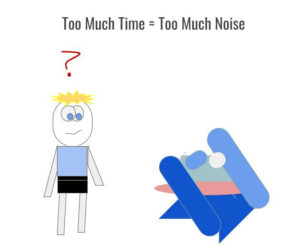
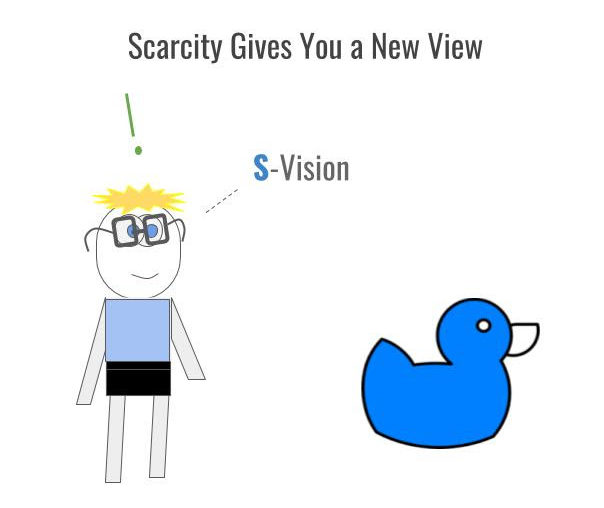
Next time you feel stretched for time, take a deep breath.
Your limited resources, could be your greatest strength.
May 28th, 2018
The Reputation Pivot
A successful executive once said to me,
“The higher you move up in a company, the more important relationships become. VPs choose whether or not to help you based on your reputation, not your skills.”
It’s this weird evolution where, when you FIRST start out in your career, your value is backed (mostly) by your abilities. Heck, you just graduated school and you barely know anyone (or anything). But fast-forward five, ten, or twenty years, and suddenly the inputs flip. Your relationships are now driving the majority of your value.
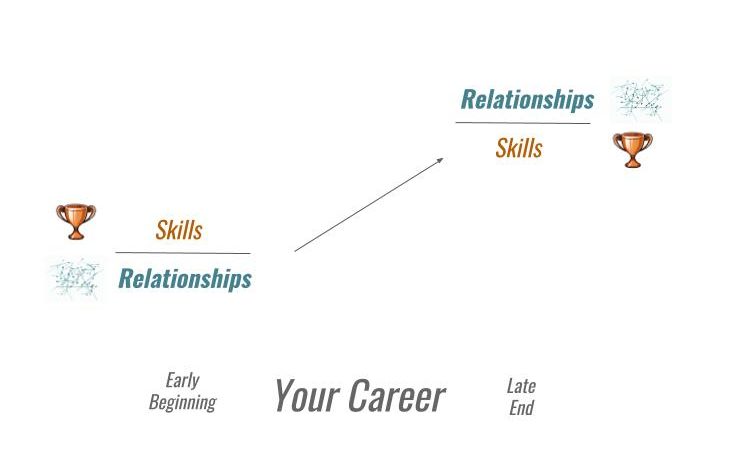
Feel like you’re plateauing at work?
Maybe you’ve accelerated your skills, but have you equally grown your relationship talent stack? Sure you might be technically capable of that next job, but are you good enough in reputation and networking?
Perhaps it’s time to pivot your focus; skill alone will not get you there.
May 21st, 2018
The Hidden Base
You’re interviewing people for your new sales team, who would you rather hire?
Group A: Scores high on an aptitude test, but has average levels of optimism
Group B: High levels of optimism, but scores average on an aptitude test
Turns out someone ran this study and if you picked B, your team performed better. Not just slightly, but significantly better.
“The optimistic group outsold their more pessimistic counterparts by 19% in year one and 57% in year two.” *
While intelligence and skill are important, we are discovering that there’s this hidden section to the chart being less discussed and it’s at the base.
75% of long term job success is predicted by three factors:
- Social Connection – the depth and breadth in your social relationships
- Optimism – the belief that your behavior matters in the midst of challenge
- Perception – the way that you perceive stress
Most people have the equation flipped (they focus on IQ), but this month we’ll be diving deeper into the base.
Buckle up because May is all about Social Connections; how to build them and why they matter.

May 14th, 2018
Which Group Are You In?
Once upon a time, a pottery teacher split her class into two halves.
To the first half she said, “You will spend the semester studying pottery, planning, designing, and creating your perfect pot. At the end of the semester, there will be a competition to see who’s pot is the best”.
To the other half she said, “You will spend your semester making lots of pots. Your grade will be based on the number of completed pots you finish. At the end of the semester, you’ll also have the opportunity to enter your best pot into a competition.”
The first half of the class threw themselves into their research, planning, and design. Then they set about creating their one, perfect pot for the competition.
The second half of the class immediately grabbed fistfuls of clay and started churning out pots. They made big ones, small ones, simple ones, and intricate ones; their muscles ached for weeks from the effort.
At the end of the semester, both halves were invited to enter their most perfect pot into the competition.
Once the votes were counted, all of the best pots came from the students that were tasked with quantity.
———————————————————————————————–
How could the volume group possibly win?
Planning is essential in achieving our goals, but sometimes we get hung up in it too long.
Just because you’re working on something, doesn’t mean you’re making progress. There’s a subtle, yet critical difference between planning (motion) and doing (action).
I can…
- Research the best diet methods (motion) or change what I eat (action)
- Email leads in my network (motion) or meet them in-person over coffee (action)
- Brainstorm business models (motion) or pitch and win investors (action)
Sometimes, we use “planning” as an excuse to guard ourselves against failure, but failure is critical to success. More likely than not, you’re ready to jump right in, but you’re scared to take the first step.
When we focus on a particular goal, we over-index on motion; planning feels safe.
But to form our full potential, we need to mistakes and feel uncomfortable; that’s action. As we saw last week, setbacks are where all the personal growth happens.
“Failure is simply the opportunity to begin again, this time more intelligently.”
-Henry Ford
While the planners were on a quest for a single, perfect pot, the volume group had real practice, which made them better at building pots. When the stakes are high, we forget to just do it.
So, what’s the pottery contest in your life?
Are you too busy planning for perfection?
It’s time to get out there and make more pots.
May 7th, 2018
Do You Need This To Succeed?
In 1987, Paulo Coelho had something special to share; he had completed a story which followed a boy searching for his destiny.
After pitching the book to various publishing houses, it was accepted and printed to sell that same year.
Over the next 6 months, he would go on to sell……. 2 books.
The publishing company revoked the rights, and the books were removed from their untouched shelves.
But Coelho was convinced it was a great book, “It was written from my soul,” he said. So, instead of giving up, he started knocking on doors.
A year later, he was given a break; a new publisher decided to give Paulo a second chance and the book was published again. Slowly, through word of mouth, it finally began selling; first one-thousand, then three-thousand, then ten-thousand book by book.
Today, The Alchemist has sold more than 115 million copies worldwide and has been translated into over 71 languages.
Paulo Coelho later said, “I’ve been rejected many times (from publishers to girlfriends). This lead me to the best publishers in the world, and to the perfect wife.”
We tend to focus on the strengths of those who succeed, but what about their setbacks?
- A young entrepreneur has a coding gift, but what about the times investors laughed at their pitch?
- An olympic athlete has the perfect body-type, but what about the countless personal injuries they trained through?
Perhaps, it’s really the obstacles that are the most critical component to our success.
Not one, not two, but many, many obstacles.
The setbacks we encounter give us the opportunity for our true selves to develop. When we tough it out, we end up learning new lessons, which are applied in the final act of our stories.
There’s a tremendous power to feeling something deep within your soul. It’s only when we keep moving forward, over and over again, that we achieve our full destiny.
What’s your setback?
Believe in yourself – get out there and start knocking on doors.
You’re just one break away from becoming a worldwide hit.
April 30th, 2018
What Slow Elevators Teach Us
Once upon a time, there was a multi-story office building in New York.
Occupants began complaining about the poor elevator service provided in the building. Waiting times became excessively long, and many tenants threatened to move out if it wasn’t fixed.
A consultant was hired and management authorized a study to determine the best solution.
The study revealed that because of the age of the building no engineering solution could be justified economically. Each option was estimated to cost millions of dollars, which would result in minimal speed improvements.
The desperate manager called a meeting of his staff, which included a graduate in psychology.
The young man decided to focus on something different. Instead of analyzing elevator speed, he studied why people were complaining.
If the complaints were a consequence of boredom, the building would need to give those waiting something to occupy their time pleasantly. Perhaps this may solve the problem, he thought. He suggested installing mirrors in the elevator lobbies; people love to look at themselves, right?
The manager took up his suggestion and installed the mirrors at a relatively low cost.
The complaints about waiting stopped.
———————————————————————————————–
Sometimes we spend a lot of time focusing on a symptom instead of the issue.
There are a lot of symptoms for each problem, so it’s easy to confuse the two. Unfortunately, once our brains see something one way, we rarely change our assumptions; it becomes harder to form new, creative paths.
Albert Einstein once said, “If I had an hour to solve a problem I’d spend 55 minutes thinking about the problem and 5 minutes thinking about solutions.”
Top performers focus on questioning the problem, not the solution. What keeps them up at night? A deep desire to understand the questions across our universe. Even 90% through a problem, brilliant minds like Einstein would continue to dispute the issue at hand.
So, which part of the equation are you spending your time on?
Could it possibly be the elevator speed, when in reality, the tenants are your concern?

[1] Ackoff, R. and Greenberg, D. (2008) Turning Learning Right Side Up: Putting Education Back on Track, New Jersey: Prentice Hall.
April 23rd, 2018
Real Positive Change
“We first make our habits, then our habits make us.”
-John Dryden
Last week, I was invited by Google to speak for Wellness Week.
Of all the possible topics, I decided to focus on forming better habits. Once you become a master of yourself, you can master anything.
Science is beginning to show us:
- Success is played at the margins (over slight, consistent improvement)
- Daily habits are more predictive of future successes than big moments
- Input-focused goals achieve the best outputs
If you were to get just 1% better everyday (instead of 1% worse), you would end up over 1000x better by the end of the year.
Architect a better strategy for your daily habits and reach your full potential.
Habit Formation and the Power of Compounding
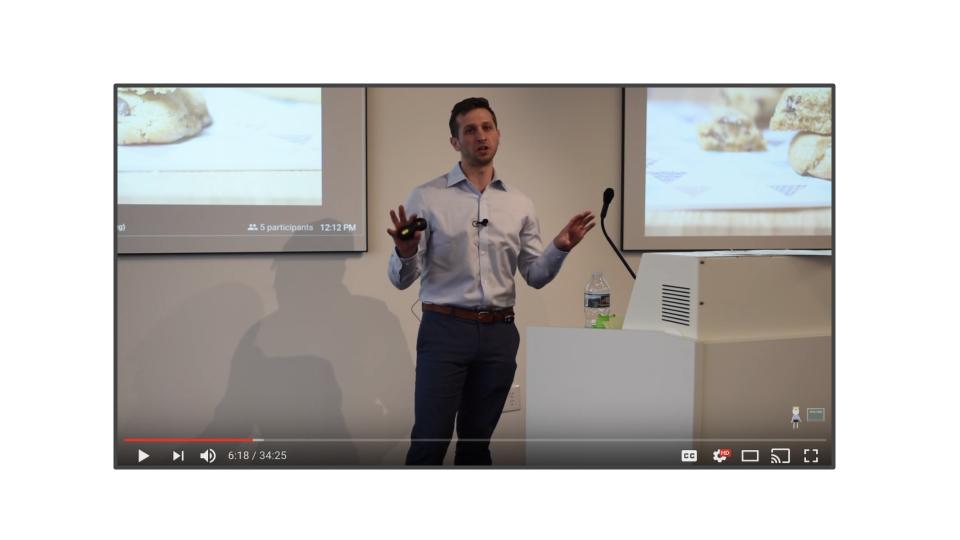
April 16th, 2018
Would You Help?
In 1973, John Darley ran an interesting study. His main goal was to understand if religion has any effect on “helping behavior.” The results uncovered the fundamental reasons we choose to act.
The study went like this:
Forty students were divided into two groups.
The first group was given a sermon to memorize on the importance of being a Good Samaritan (helping others etc). They were told that soon after reading it, they would need to present the speech at another building across campus.
The second group was given a talk on job opportunities and the same instructions. They too would need to walk across campus and present their speech in another building.
There were two twists:
Subjects were given different times that they had to deliver the sermon so that some would be in a hurry and others not.
On the way to the building, everyone would pass the same stranger slumped in an alleyway, who looked to be in need of help.
Q: Which group would be more likely to help the person in need?
A: It wasn’t the Good Samaritan group. In fact, neither group stopped more often than the other to help.
It turns out, the only factor that made a difference was how much of a hurry the students were in.
When we feel rushed, we are less likely to notice what’s going on around us. When it comes to living by our moral code, that can also fall by the wayside.
How many times have you walked the same city block or taken the same route to work? When was the last time you really noticed what was going on right in front of you?
Science is now gleaning more about human potential than ever before.
Top performers notice the subtle factors in their environment, which leads them to faster and more creative solutions. It’s not their IQ or EQ (though those help), but instead their ability to perceive the situation that truly sets them apart.
Are you preparing a Good Samaritan speech in your head, but ironically ignoring those who need help right in front of you?
April 9th, 2018
Good Luck or Bad?
Once upon the time there was an old farmer who had worked his crops for many years.
One day his horse ran away. Upon hearing the news, his neighbors came to visit. “Such bad luck,” they said sympathetically.
“Perhaps,” the farmer replied.
The next morning the horse returned, bringing with it three other wild horses. “What great luck!” the neighbors exclaimed.
“Perhaps,” replied the old man.
The following day, his son tried to ride one of the untamed horses, was thrown, and broke his leg. The neighbors again came to offer their sympathy on his misfortune.
“Perhaps,” answered the farmer.
The day after, military officials came to the village to draft young men into the army. Seeing that the son’s leg was broken, they passed him by. The neighbors congratulated the farmer on how well things had turned out.
“Perhaps,” said the farmer.
—–—–—–—–—–—–—–—–—–—–—–—–—–—–—–—–—————
Human nature has wired our brains to judge achievement and setbacks on an immediate basis. When things go wrong, we throw our hands up right away. This leads to these sort of “half stories,” which limit our potential.
Half story: I was turned away from +10 companies my senior year of college.
…Bad luck.
Full story: The week of graduation, a role opened and I got a job at Google.
…Good luck.
Same story, different luck.
This extends itself beyond setbacks; what about the way we consume news? Most headlines may as well read, “We don’t know all the details, but we’re confident this is bad.”
Immediate judgement prohibits us from seeing the full picture, when in reality, the story isn’t complete.
Before we’re able to declare luck (good or bad), our stories need time to develop.
Which story have you ended too quickly?
Is that setback actually the beginning to a great luck tale of your own?
“Perhaps.”
April 2nd, 2018
A Happiness Epidemic
In 1518, a case of dancing mania broke out on the streets of Strasbourg, France.
When Frau Troffea started dancing, neighbors thought she was having a psychotic episode. But when she refused to stop, the spirit eventually became irresistible; others couldn’t help but join in.
Within a few days, thirty more people started and, by the end of the month, four hundred villagers were shaking their tail-feathers.
We tend to underestimate the power of those around us; our actions are influenced by those we interact with most.
When we shine a positive light at work or at home, we are directly impacting our teammates and families. By focusing on our wellness, we can create a happiness mania that spreads for months; just like Frau Troffea.
We can transform the well-being of those around us, including ourselves. And that’s worth dancing about.
March 26th, 2018
Man in the Mirror (Neurons)
Everyday we send signals to each other.
Research suggests that when we view others doing an action, our brains fire neurons as if we’re performing the action ourselves. This explains why we cringe when we see a movie character crash their car or suddenly feel tired when we see someone yawn.
These cells are called Mirror Neurons and they help our brain naturally mimic others to better understand the context of what’s going on around us.
But this power goes beyond the big screen and has greater implications than an inconveniently timed nap.
What emotions are you sending to your teammates? How do your behaviors affect other people? Are you glancing at your phone on the table during a meeting?
Your actions work like a two-way mirror; they reflect from yourself onto the other person.
Start by paying attention to your own signals and “make that change.”
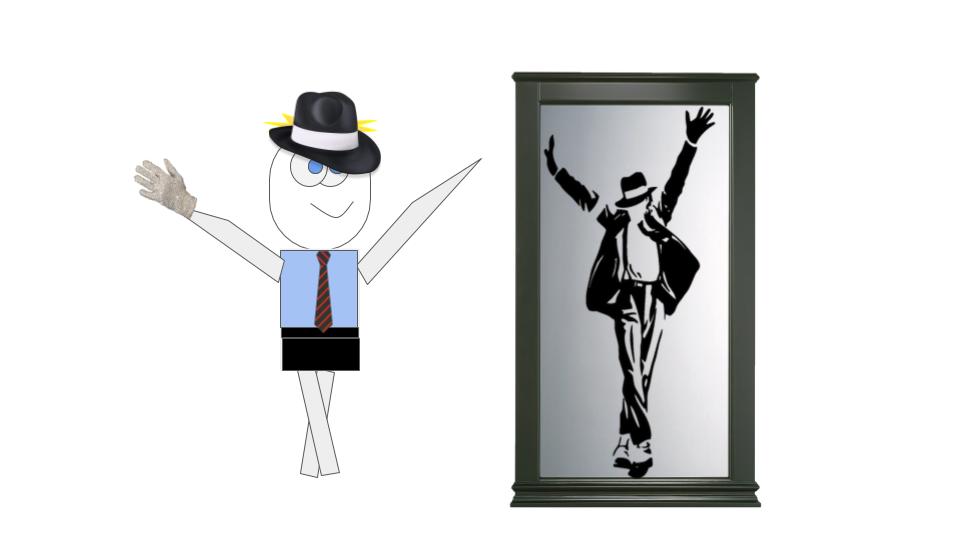
March 19th, 2018
The Ultimate Superpower
Between 1933 and 1945, the Nazis opened more than 40,000 concentration camps across Europe. Millions of people were stripped of their rights, forced into labor, and dehumanized; one of those people was a psychiatrist named Viktor Frankl.
His parents, brother, and wife were killed inside the camps; he nearly lost his entire family. Each morning, he woke up with less faith in humanity.
One day, he became aware of what he called, “the last of human freedoms.”
While everything was taken from him, there was one thing they could not take: the freedom of choice. He still had the ability to decide how his circumstances would affect him. This one power gave him the strength to survive the war and go on to publish 39 books and receive 29 honorary doctoral degrees.
Each time something happens, there is moment between the action happening and your reaction. Inside this space, each person has the ability to choose their way forward.
It doesn’t matter what the situation is; you always control the space. Sometimes the space feels small, sometimes, it feels non-existent, but it’s always there. If Dr. Frankl was able to recognize the space despite his extreme, despondent circumstances, it can always be found. Recognizing the power to control the reaction is stronger than any comic book characters’ supposed gift.
It’s not what happens to us, but how we respond that determines our reality.
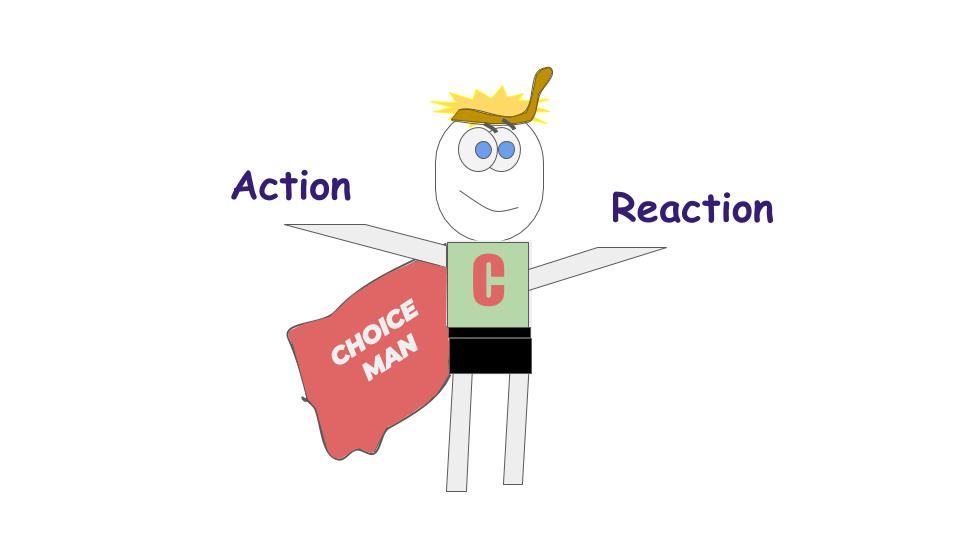
March 12th, 2018
Impossible Records
In the 1950’s after rigorous mathematical computations of the physics of our anatomy, experts concluded that it was impossible for a human to run a mile in less than 4 minutes.
A physical impossibility, scientists said. Then along came Roger Bannister, who in 1954 broke the barrier with an official time of 3:59.4
Suddenly, the floodgates opened. Within a month, Roger’s record was beat. Within the next four years, runners would continue to oust each other. Today the record stands at 3:43.13
We tend to look at averages to determine what is attainable. Truth is, we do not know the limits of human potential. Our brains change in response to our actions and circumstances.
When we bring talented people together our baseline for achievement rises and suddenly we’re all breaking records once deemed “impossible.”
March 5th, 2018
Knowledge has a ROI
“An investment in knowledge pays the best interest.”
-Benjamin Franklin
Most people know about financial compounding, but few recognize intellectual compounding. That same exponential curve can also be applied to your growth as a thinker, an entrepreneur, or any knowledge-seeker. Albert Einstein called this the greatest power in the entire universe.
What are your greatest skills waiting to be developed further? When we start early and stay consistent, our ordinary talents become extraordinary talents. Compounding interest helps us achieve our greatest potential but, just as importantly, lifts everyone else around us up too.
February 26th, 2018
Focus on the Valuable Reality
Here’s what I can tell you about stress…
- It’s 1 of 6 leading causes of death
- 70-90% of doctor’s visits are attributed to stress
- It negatively affects human organs
But what I can also tell you about stress…
- It helps boost performance on cognitive tasks and memory
- It narrows your perspective and increases brain processing speed
- It’s shown to facilitate deeper bonds, also known as post-traumatic growth
Both are equally true.
In a recent study, they took 380 bankers and divided them into two groups. The first group was given all the negative facts about stress and then told, “Try not to stress out this week.” The second group was given all the positive facts about stress and then told, “Try to use stress to your advantage this week.”
One week later, the second group (positive primed) saw a 23% decrease in all symptoms related to fatigue and a +30% increase in productivity*
Perspective matters. We all have a choice in the way we perceive situations; whether it’s a personal setback, work-related struggle, or an unpredicted event, you can control your perception. Push yourself to view how a challenge is also an opportunity. When we choose the most valuable reality, we reach our greatest potential.
February 19th, 2018
Solving the Impossible
The U.S. Government spent billions of dollars attempting to land on the moon. Many people complained that the money should have been spent on poverty.
Randy Pausch once responded, “When you use money to fight poverty, it can be of great value, but too often, you’re working at the margins. When you’re putting people on the moon, you’re inspiring all of us to achieve the maximum of human potential, which is how our greatest problems will eventually be solved.”
Our greatest breakthroughs happen when we aren’t focusing on the issue at hand, but instead broadcasting our most ambitious goals. By working on things that fascinate us, we create industries that don’t yet exist and solve problems we never imagined possible.
February 12th, 2018
Setbacks by the Thousand
Edison had 1,000 documented failed designs of the light bulb.
It took the Wright brothers 1,000 trials to increase their distance traveled by a mere 200 feet.
Colonel Sanders’ famous secret chicken recipe was rejected over 1,000 times before KFC accepted it.
It’s easy to be discouraged by failure. Brick walls are being built around us everyday. At first glance they may seem like they are keeping us out, but if you stick around long enough, you’ll find something different.
Brick walls are there to give us a chance to show how badly we want something. Walt Disney was fired from a newspaper company because he “lacked imagination and had no good ideas.” When Walt Disney finally made it, he famously said, “If you can dream it, you can do it.” … BAM take that brick wall.
February 5th, 2018
Don’t be afraid to ask for help.
In a recent study, participants were asked to go out in NYC and ask random strangers to…
Fill out a survey – they estimated that 25% of strangers would do it, but 50% did
Borrow a cell phone – they estimated that 30% would say yes, but 48% did
Be walked to a nearby gym – they estimated 14%, but 43% did
Sometimes we underestimate others’ willingness to help. We tend to focus on the costs of saying yes, overlooking the costs of saying no. The whole is greater than the sum of the parts, all you have to do is ask.
Study found in Adam Grant‘s book, “Give and Take, A Revolutionary Guide to Success.”
January 16th, 2018
Saying a competitor doesn’t have your scale is not an answer.
Blockbuster CEO, “Neither RedBox nor Netflix are even on the radar screen in terms of competition” (Dec 11, 2008)
This was 100% accurate at the time. Limited (high speed) internet, minimal streamable content, zero “original” programming budgets.
Fedex CEO, “Amazon is a retailer not a transportation company… They are nowhere near the scale of FedEx.” (March 22, 2017)
Also, 100% accurate today. Amazon has a limited private fleet, minimal delivery drones and zero flying warehouses.
Amazon’s core competency is last mile delivery and frictionless purchases. Their last mile infrastructure is positioning itself as the next AWS.
Your view of “scale” doesn’t stop innovation or time.
August 8th, 2017

